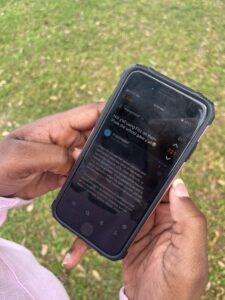
On March 7, FAMU sent an email from the Office of Information Technology Services to all students and staff about the ban on certain websites and apps. The ITS, the State of Florida, and the Federal Government banned TikTok and Fizz from being installed or accessed on any university-owned equipment. The ban includes desktops, laptops, tablets, iPads, cellphones, televisions and network devices. If there is an attempt to access these sites or apps, which are now blocked, you will be redirected to a FAMU unauthorized access page.
This ban has left students with many questions, like first-year allied health science student Alyssa Jordan, who is familiar with both platforms and even uses them in the classroom with the guidance of their professors.
“I’m confused, many of my professors have used or encouraged students to use platforms like TikTok when making videos for class,” Jordan said. “Our professors use TikTok in classes as well to keep students engaged and interested in the lesson. So what now?”
It has been a common theme over the past year for professors to slowly begin incorporating social media platforms in the classroom to captivate students’ attention, which has become more challenging to hold. Professors know students are on social media for a good portion of the day and want to use those same tools to educate their students. So that leaves a good question, how will this ban on university equipment affect student and professor presentations and uses?
“I understand the ban of Fizz though,” Jordan said. “The app is good and bad, it has its pros and cons, you can use it as a support system or as the opposite, like today I actually found out on Fizz that the university sent out this ban,” said Jordan. “It can be a helpful tool, but most times it’s used for nothing but gossip, and people just talking for upvotes.”
Third-year pre-physical therapy scholar Kennedy Mote has some strong feelings about the Fizz app and the impact it has on campus.
“I personally don’t like it,” Mote said. “I feel like it was originally created with positive intent but now students use it as another form of bullying and harassment.”
Due to the fact that many students find the social platform toxic and harmful to the student body, we can’t help but acknowledge that it has, on the other hand, being one of the most influential platforms on FAMU’s campus. From election season to probate season, it’s the number one place FAMU students go to engage in conversation behind anonymous aliases. Due to this app’s extensive but short history, many believe the university was right to ban the platform, but not all.
TikTok has become a very useful tool within the classroom that not only keeps students engaged but can also be used as an educational tool in the classroom.
“I don’t think they should ban both platforms but there should be certain restrictions,” Mote said. “Social media (TikTok) can be used for positive things, many people learn from it, I think it’s something the university should consider.”
While schools can’t dictate what students do off campus, they can restrict the app’s usage within school walls. Professors have used social media in exciting and valuable ways, such as connecting with students, teaching about the risks of social media, and delivering small, quick lessons. But it is not clear whether these positive effects counterbalance the potential and actual harm. All in all, the university is doing what they see best to protect the university students and staff.